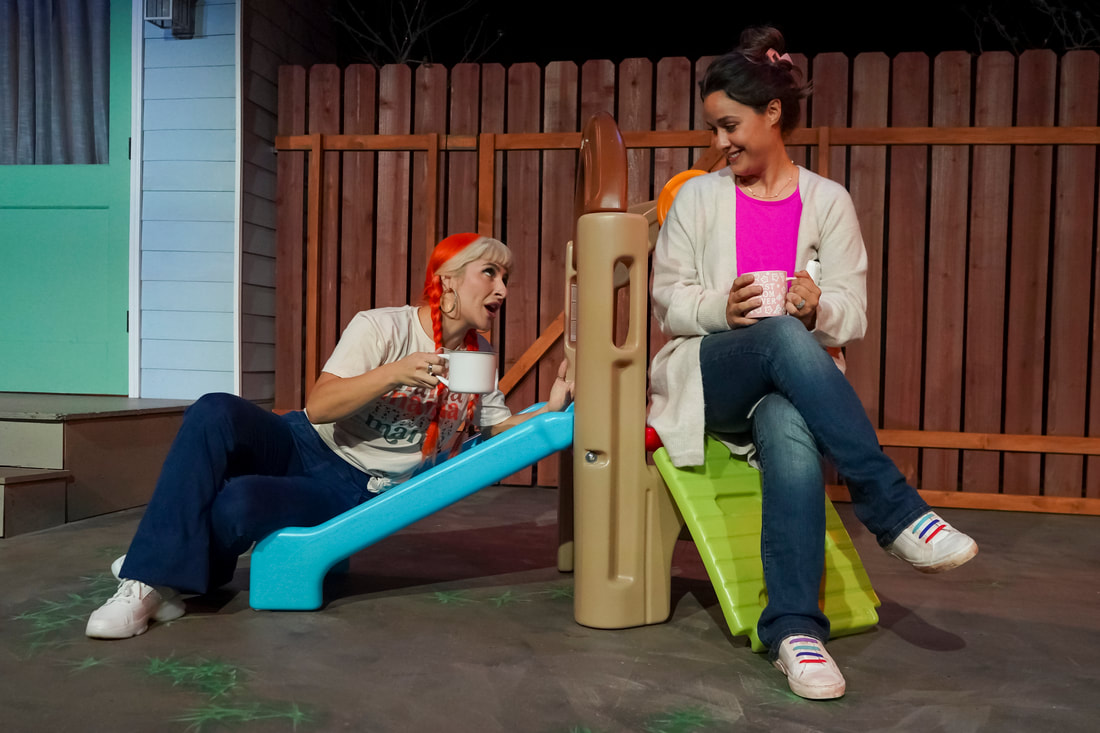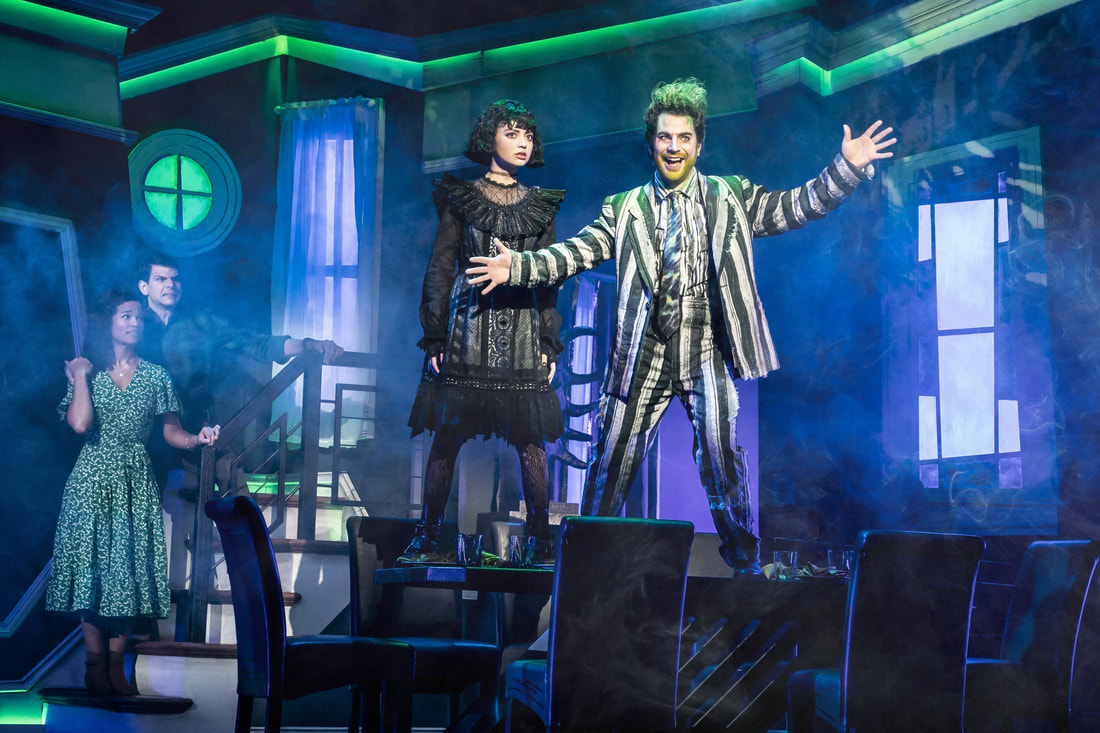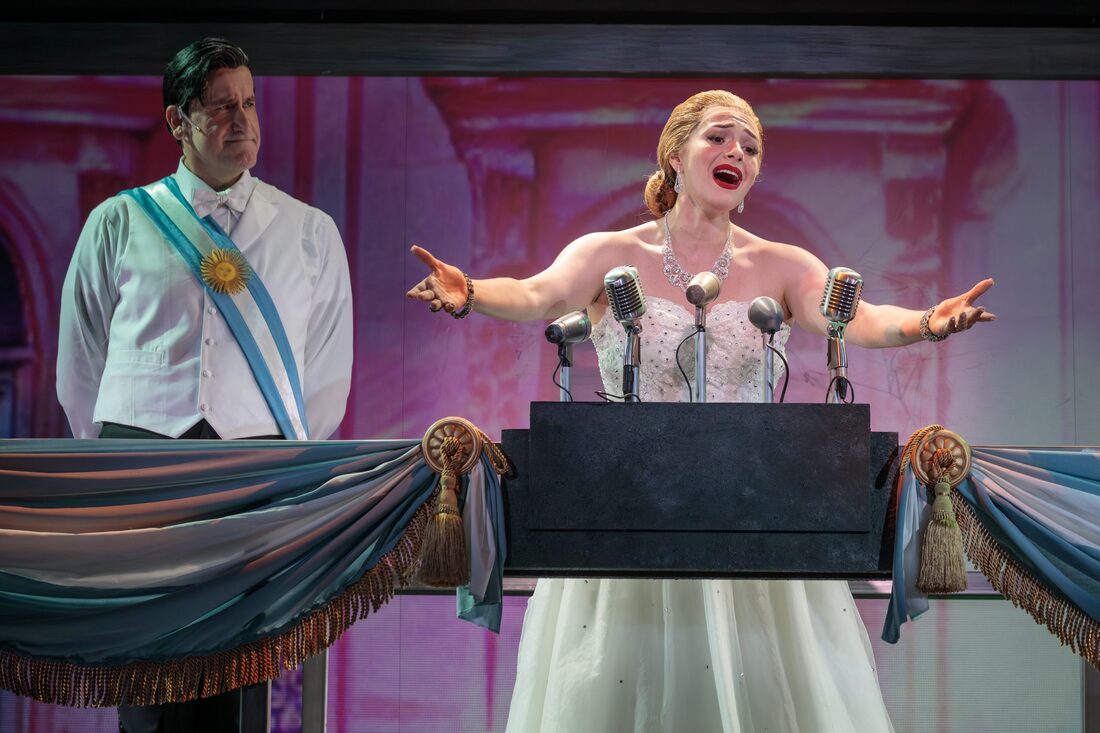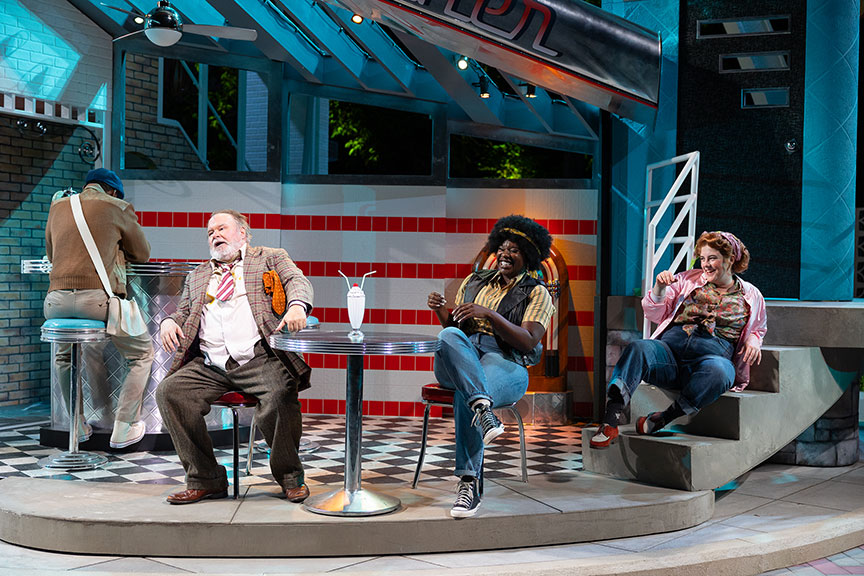|
Kylie Young (left) and Katee Drysdale in "Cry It Out." Photo by Daren Scott Jessie just had a baby. Now she’s got a serious case of mommy-it is.
Lina just had a baby. No worries. She’s got this. Adrienne just had a baby. She’s angry – about everything. New motherhood, with its highest of highs and lowest of lows, is the subject of Molly Smith Metzler’s “Cry It Out,” a 90-minute drama that is kicking off Moxie Theatre’s 19th season and is its first curated show from new executive artistic director Desiree Clarke Miller. Vanessa Duron, Moxie’s associate artistic director, directs this production that stars Katee Drysdale as Jessie, Kylie Young as Lina, Leah Morgan as Adrienne and Alex Guzman as Adrienne’s harried husband Mitchell. Obviously I’ve never had a baby and I’ve never even had one around the house, so I can’t fully appreciate the joys and trials of motherhood. What I can appreciate are the feelings that must be overwhelming, especially to new mothers, who not only have gone through the physical demands of bringing a new life into the world but the emotional and psychological challenges that follow, including the upturning of the lives they once knew. “Cry It Out” attempts to articulate these feelings and challenges. That it takes an hour and a half to do so feels redundant, and the unexpected and flat ending adds up to a rather unsatisfying play that mines familiar territory. Sincere performances by both Drysdale, also exceptional earlier this year in Scripps Ranch Theatre’s “Lost in Yonkers,” and Young can’t make up for the middling script. The cultivated sounding Jessie, a successful attorney on the verge of partnership, and Lena, a hospital worker living with her baby daddy and his alcoholic mother, become fast friends, hanging out in Jessie’s backyard with their smartphones functioning as baby-cams. The more brash, cynical Lina also boasts the thick Long Island accent. They’re like Mary and Rhoda 50 years later: Sweet, unselfish Jessie almost too nice to be true, and the earthier, wisecracking Lina, refusing to take crap from anyone. But here’s where the credibility is stretched. We’re told that a neighbor up the hill, Mitchell, has been watching the two friends during their between-baby-care coffee klatches in the yard THROUGH A TELESCOPE. He shows up at the backyard uninvited one day and asks them if his wife, who he says is showing zero interest in their new baby, can hang out with them. Sweet, unselfish Jessie assents, even though wisecracking (and the more wise) Lina thinks it’s a nervy, crackpot idea. Mitchell’s wife proves Lina right when she does show up, having been driven over by a nanny (one with a graduate degree in child development, of course), and proceeds to give new meaning to the word rude. Sweet Jessie’s reaction is to be concerned and to worry and wonder about rude Adrienne constantly and to continue to invite her over again. Lina? Not buying it. Where this heads is not good, for any of them. So Metzler’s point? Motherhood is hard? No two (or three) mothers are the same? There’s no handbook for the job? I think she wants to comment on the crisis young working mothers endure when deciding between their jobs and staying home with their new babies. But these Long Islanders, Lina’s financial woes notwithstanding, don’t seem representative of the kinds of mothers who really and truly ache to the core when trying to make such a decision. The title of the play suggests too that emotions shouldn’t be suppressed in making these trying decisions, that it indeed is better to cry it out. That doesn’t get sweet Jessie anywhere, and the same could be said for the more sympathetic Lina. As for Adrienne, her character is drawn so one-note that when she tries to get real late in the play, it isn’t at all convincing. Drysdale can’t help but be winning even with the limitations of her role. Minus the too-heavy accent, Young is a genuine presence in those backyard coffee klatches. Morgan is saddled with that aforementioned one-note role – the most dramatic thing she gets to do is throw eggs at Jessie’s house. Guzman does a mighty fine panic attack; otherwise he’s compelled to be merely neurotic. Alyssa Kane’s Manorhaven backyard is a pleasant place for Jessie and Lina to hang out, while the lighting by Sierra Shreves and Colby Freel organically change the setting from day to night or vice versa as called for. The fact is, everybody tries their damnedest to make “Cry It Out” work, but there’s only so much that can be done with a play that comes with built-in narrative flaws and not enough true catharses. “Cry It Out” runs through Sept. 10 at Moxie Theatre in Rolando.
0 Comments
Left to right: Britney Coleman, Will Burton, Isabella Esler and Justin Collette in "Beetlejuice The Musical,." Photo by Matthew Murphy If the Grinch who appears onstage at the Old Globe every holiday season wore black and white stripes and had permission to spout pointed political commentary and be profane, you’d have Beetlejuice.
This occurred to me while in the audience of the national touring production of “Beetlejuice The Musical” at the Civic Theatre. Not just because both characters are howlingly funny and big – the Grinch bigger than life, Beetlejuice bigger than death – but in each show, the fun lessens when the star is not onstage. Now it’s true that Michael Keaton, who starred in Tim Burton’s 1988 “Beetlejuice” film, was on screen only 15 minutes or so, but the movie’s spectacular and spooky effects ensured that its momentum was never slowed. In the stage musical written by Eddie Perfect (music and lyrics) with Scott Brown and Anthony King (the book) the Beetlejuice character is definitely more prominent than in the film, but in the second act he takes a back seat to the Lydia character, and little by little this show doesn’t seem that different from so many other Broadway adaptations of hit movies. I’ll come back to this. First, a ‘lil history. The “Beetlejuice” musical opened on Broadway in April 2019 and ran almost a year until it was forced to close, like everything else, by the onset of COVID. After a brief return to the Great White Way, this national tour began. Thus, many if not most people are seeing the show for the very first time. They’re seeing it in style too. At the Civic, quite a few folks were clad in various combinations of black and white stripes. This definitely contributed to the party atmosphere in the old downtown theater. Perfect’s story is similar to but departs in relatively insignificant ways from the original “Beetlejuice” script by Michael McDowell, Warren Skaaren and Larry Wilson. Married couple Adam and Barbara Maitland (Will Burton and Britney Coleman) die together via electrocution in their “dream home” (in the film it’s a car accident) and find themselves on the Other Side. They learn from the dead but not deadpan Beetlejuice (Andrew Kober, who’s alternating in the strenuous part on tour with Justin Collette) that they can “keep” their house by haunting away the new owners: the get-rich-quick Charles Deetz (Jesse Sharp) and his depressed goth daughter Lydia (Isabella Esler). That’s about it. The two-hours-plus show is otherwise occupied with parading out outlandish supporting characters including Charles’ mistress Delia (Katie Marilley), her guru Otho (Abe Goldfarb) and, in the Nether World, a creepy ensemble of ingeniously costumed dead folks. As you’d expect “Beetlejuice” the musical, like the film, is mostly about its technologically born visuals. It’s garish, it’s ghoulish, it’s even got a giant sand worm. The all-stars who deserve standing o’s on this tour: William Ivey Long (costume design); David Korins (scenic design); Jeremy Chernick (special effects design), Michael Weber (magic and illusion design), and many others whom I apologize for not mentioning that make this show like an E-ticket ride at Disneyland. (Remember those, boomers?) The musical score is not what you’d call hit-laden, but there are a number of rousers, such as the opening “The Whole ‘Being Dead’ Thing,” “Fright of Their Lives” and “Say My Name,” all from the first act, and both “What I Know Now” and “Creepy Old Guy” in the second. Yes, “The Banana Boat Song,” so memorable in the movie “Beetlejuice,” is here, and it’s a definite highlight in Act One. It’s the staging of these songs that define them – kudos to director Alex Timbers and choreographer Connor Gallagher. The ballads, of the power variety and otherwise, are the province of young Esler, a performer beyond her years, though she doesn’t really elevate them above typical Broadway fare. I’ve learned to live with and endure standard-issue balladry. My only genuine frustration with this production is that so many of the wickedly funny lyrics sung by the Beetlejuice character are lost in the accompanying music or in the sheer speed with which they’re required to be sung. Kluber makes the best of it and he is undeniably physical and funny. I’d like to compare his performance to Collette’s, but this is a red-hot ticket in town so I’m done with “Beetlejuice.” Without question Esler is asked to carry the load in this production and certainly given her age, she does so with remarkable poise. Burton and Coleman are likable as the Maitlands while Marilley’s Delia is second only to the Beetlejuice character when it comes to comically commanding scenes. I’ve read that Tim Burton had begun production on a sequel to the original “Beetlejuice” film, with both Keaton and co-star Winona Ryder, who played Lydia, returning. It’s been halted for the time being by the strikes in Hollywood. Seeing “Beetlejuice” the musical reminded me how much I enjoyed the movie those many years ago, and while sequels generally disappoint, especially those that arrive decades later, this one could be promising. As he showed in the otherwise dismal “The Flash,” Keaton has lost nothing off his fastball when it comes to signature characters he’s played (Batman in that case), and he likely would turn a “Beetlejuice 2” into “Showtime!” again. All this being said, folks who’ve never seen the “Beetlejuice” movie will still enjoy the stage musical and the bio-exorcist showman whose name is on its marquee. “Beetlejuice The Musical” presented by Broadway San Diego runs through Aug 20 at the Civic Theatre, downtown. Berto Fernandez and Ariella Kvashny in "Evita," Karli Cadel Photography Like its predecessor “Jesus Christ Superstar,” Andrew Lloyd Webber and Tim Rice’s “Evita” was conceived as a rock musical and was released as a record album before ever being produced in a theater. While a strong case can be made that “JCS” is a rock ‘n’ roller, the ballad- and showtune-heavy “Evita” never felt like one. But these two have something inarguably in common: Both were smash hits on Broadway and have enjoyed productions around the world ever since their New York debuts (“Superstar” in 1971, “Evita” in 1979).
Cygnet Artistic Director Sean Murray told the opening night audience Saturday that he’d wanted to do “Evita” since 1978. That was the year of its West End debut. Murray’s dream has been realized: “Evita,” under his direction, is onstage in Old Town. With stout musical direction by Patrick Marion and brilliant choreography by Carlos Mendoza, Murray’s is an “Evita” to be proud of. This production is not without a defect. The acoustic compatibility between the backstage band and the singing cast wavers. It’s often difficult to understand what the show’s narrator, the Argentine everyman Che (A.J. Mendoza) is saying in song. Likewise the star, the luminous Ariella Kvashny, whose lyrics are mostly lost when she sings in a higher register. As for Lloyd Webber and Rice’s show itself, it’s true that “Evita” hinges principally on one song – “Don’t Cry For Me Argentina” and its reprises – and as a nearly sung-through musical it can have a stagey, operatic feel. But at Cygnet this a dynamic “Evita” production. The kinetic and recurrent choreography of Mendoza’s and Blake McCarty’s newsreel-like projections behind the stage ensure that there’s always someone or something moving, giving the show momentum and view points. This “Evita” never falls into a lull. I especially admired the tango dancers under the direction of Nicole Wooding whose movement provides a poignant parallel onstage to the courtship-to-music of actress Eva Duarte and Juan Peron (the towering Berto Fernandez), soon to be president of Argentina. Cygnet’s stage is not an expansive one, but every inch is maximized to give the musical the sort of sweeping veneer that a story about change and turmoil in Argentina in the 1940s should possess. The first act-closing, flag-waving “A New Argentina” is as rousing as the “Evita” I saw back in 1980 at the Shubert Theatre in Century City on its first national tour. Any discussion of an “Evita” production, however, should rightly begin and end with the artist in the lead role. As Kvashny told me in a recent interview I did with her for The San Diego Union-Tribune, this part Is the biggest she’s ever had in her still young career. And she nails it. In spite of the acoustic issues, she demonstrates her formidable vocal range and, wonderfully costumed (as is the cast as a whole) by Zoe Trautmann, Kvashny is a charismatic Eva who goes from good-time-girl to the most influential woman in the country in a stunningly short amount of time. Kvashny makes this transition credibly and her stage presence – the fuel of Eva Peron’s rise to prominence – is redoubtable. Fernandez’s is the show’s booming voice, yet he brings appropriate sensitivity to the Peron who in the end must watch his beloved partner physically deteriorating. Truth be told, I’ve never liked the Che device in “Evita.” (He’s not revolutionary Che Guevara, by the way.) It seems like a narrative contrivance, telling us throughout what we should already be thinking about this extraordinary woman who was saint to some, opportunist or hypocrite to others. This is not a criticism of actor A.J. Mendoza at all. He swaggers and comments just as the script prescribes. This show’s crowd-pleasing character is Magaldi, the showman who is also Eva’s first lover and who brings her to Buenos Aires. The animated Matthew Malecki Martinez does not disappoint in the role. “Evita” is bookended by the death of a woman who notably said “My biggest fear in life is to be forgotten.” Fear not, Eva. “Evita” runs through Oct. 1 at Cygnet Theatre in Old Town. Berto Fernandez and Ariella Kvashny in "Evita." Karli Cadel Photography Like its predecessor “Jesus Christ Superstar,” Andrew Lloyd Webber and Tim Rice’s “Evita” was conceived as a rock musical and was released as a record album before ever being produced in a theater. While a strong case can be made that “JCS” is a rock ‘n’ roller, the ballad- and showtune-heavy “Evita” never felt like one. But these two have something inarguably in common: Both were smash hits on Broadway and have enjoyed productions around the world ever since their New York debuts (“Superstar” in 1971, “Evita” in 1979).
Cygnet Artistic Director Sean Murray told the opening night audience Saturday that he’d wanted to do “Evita” since 1978. That was the year of its West End debut. Murray’s dream has been realized: “Evita,” under his direction, is onstage in Old Town. With stout musical direction by Patrick Marion and brilliant choreography by Carlos Mendoza, Murray’s is an “Evita” to be proud of. This production is not without a defect. The acoustic compatibility between the backstage band and the singing cast wavers. It’s often difficult to understand what the show’s narrator, the Argentine everyman Che (A.J. Mendoza) is saying in song. Likewise the star, the luminous Ariella Kvashny, whose lyrics are mostly lost when she sings in a higher register. As for Lloyd Webber and Rice’s show itself, it’s true that “Evita” hinges principally on one song – “Don’t Cry For Me Argentina” and its reprises – and as a nearly sung-through musical it can have a stagey, operatic feel. But at Cygnet this a dynamic “Evita” production. The kinetic and recurrent choreography of Mendoza’s and Blake McCarty’s newsreel-like projections behind the stage ensure that there’s always someone or something moving, giving the show momentum and view points. This “Evita” never falls into a lull. I especially admired the tango dancers under the direction of Nicole Wooding whose movement provides a poignant parallel onstage to the courtship-to-music of actress Eva Duarte and Juan Peron (the towering Berto Fernandez), soon to be president of Argentina. Cygnet’s stage is not an expansive one, but every inch is maximized to give the musical the sort of sweeping veneer that a story about change and turmoil in Argentina in the 1940s should possess. The first act-closing, flag-waving “A New Argentina” is as rousing as the “Evita” I saw back in 1980 at the Shubert Theatre in Century City on its first national tour. Any discussion of an “Evita” production, however, should rightly begin and end with the artist in the lead role. As Kvashny told me in a recent interview I did with her for The San Diego Union-Tribune, this part Is the biggest she’s ever had in her still young career. And she nails it. In spite of the acoustic issues, she demonstrates her formidable vocal range and, wonderfully costumed (as is the cast as a whole) by Zoe Trautmann, Kvashny is a charismatic Eva who goes from good-time-girl to the most influential woman in the country in a stunningly short amount of time. Kvashny makes this transition credibly and her charisma – the fuel of Eva Peron’s rise to prominence – is redoubtable. Fernandez’s is the show’s booming voice, yet he brings appropriate sensitivity to the Peron who in the end must watch his beloved partner physically deteriorating. Truth be told, I’ve never liked the Che device in “Evita.” (He’s not revolutionary Che Guevara, by the way.) It seems like a narrative contrivance, telling us throughout what we should already be thinking about this extraordinary woman who was saint to some, opportunist or hypocrite to others. This is not a criticism of actor A.J. Mendoza at all. He swaggers and comments just as the script prescribes. This show’s crowd-pleasing character is Magaldi, the showman who is also Eva’s first lover and who brings her to Buenos Aires. The animated Matthew Malecki Martinez does not disappoint in the role. “Evita” is bookended by the death of a woman who notably said “My biggest fear in life is to be forgotten.” Fear not, Eva. “Evita” runs through Oct. 1 at Cygnet Theatre in Old Town. A rumpled Tom McGowan (left) stars in "The Merry Wives of Windsor." Photo by Rich Soublet II It is said that Shakespeare wrote “The Merry Wives of Windsor” at the behest (demand?) of Queen Elizabeth I who wanted a play about the Falstaff character from the “Henry” histories dabbling at love. The Bard, the story goes, had only a couple of weeks to comply.
The result was “The Merry Wives of Windsor,” a trifle that finds the corpulent Sir John Falstaff pitching woo (or haplessly trying to pitch it) to the married Mistress Ford and Mistress Page. Why it takes five acts to dramatize the misadventures of “Merry Wives” is a mystery. It can only be attributed to Shakespeare’s prolificacy. It’s a frequently funny but highly redundant comedy. Perhaps knowing this, the creative team behind the Old Globe’s Summer Shakespeare Festival production of “The Merry Wives of Windsor” has chosen to go the route of the madcap ‘50s sitcom (see “I Love Lucy”). Sight gags and bits of shtick abound. The only thing missing is a laugh track. The motif is a mashup -- in costumes, sets and timely “modifications” to Shakespeare’s script -- of the wholesome postwar decade of “Lucy” and “Leave It to Beaver,” the classic American drive-in diner, and the rebel spirit of James Dean and Elvis. Director James Vasquez gives his large cast full, free rein. To some extent, that works just fine: As the wives courted by Falstaff who are then determined to exact delicious revenge on him (that’s it: the entire, paper-thin plot), Angela Pierce (as Mrs. Ford) and Ruibo Qian (as Mrs. Page) are wily and formidable schemers in the Lucy-and-Ethel tradition. This production’s Falstaff, Tom McGowan, lopes along like a big unmade bed, and he’s so un-lecherous acting that you almost feel sorry for his being duped by the two wives. McGowan never overplays his hand, regardless of the ridiculous situations Falstaff finds himself in, whether it’s dressed up like an old woman, antlered like Herne the Hunter, or climbing into a laundry basket reeking of soiled clothing. Conversely, Jenn Harris’ Mistress Quickly is played so broadly she makes McGowan look sheepish in their scenes together. And Jesse J. Perez’s French accent as Dr. Caius is pure Pepe Le Pew. The genuine star of this “Merry Wives,” with apologies to the very good McGowan, is the revolving, multi-scene set created by Diggle. It’s one of the best and most versatile I’ve ever seen in a Summer Shakespeare production at the Globe. There’s of course the quintessential ‘50s diner, with soda fountain, flanked by palm trees. The two-story digs of the Pages and Fords is just a rotation away, as is Windsor Park, site of the culminating teasing dance of the “fairies.” The seamless scene changes allow the second half of the story to unfold just as seamlessly, making Act Two of the show the swifter and more engaging. Lex Liang’s costumes for all are delightfully evocative of the period. Each outfit reflects the nature of the character, from Mistresses Ford and Page’s smart dresses to the leather and denim worn by Fenton (Jose Balistrieri), the Fonzie-like suitor of the Pages’ daughter, Anne. Under the direction of sound designer Melanie Chen Cole, the action is punctuated by the rumble of a motorcycle, the timely gong of a clock and musical transitions that resurrect rock ‘n’ roll oldies of the decade. If you’re getting the impression that this “Merry Wives” is better served by its technicals than its narrative heft, you’d be right. It’s lightweight and diverting summer fare but rarely as hilarious as it hopes to be. There’s a painting somewhere by David Scott depicting Queen Elizabeth I watching a performance of “The Merry Wives of Windsor” at the Globe Theatre in London. It’s hard to tell if she’s as smiling in it. We will never know. We do know this: William Shakespeare was her dutiful subject. “The Merry Wives of Windsor” runs through Sept. 3 on the Old Globe’s Lowell Davies Festival Stage in Balboa Park. |
AuthorDavid L. Coddon is a Southern California theater critic. Archives
July 2024
Categories |
David Coddon |
|



